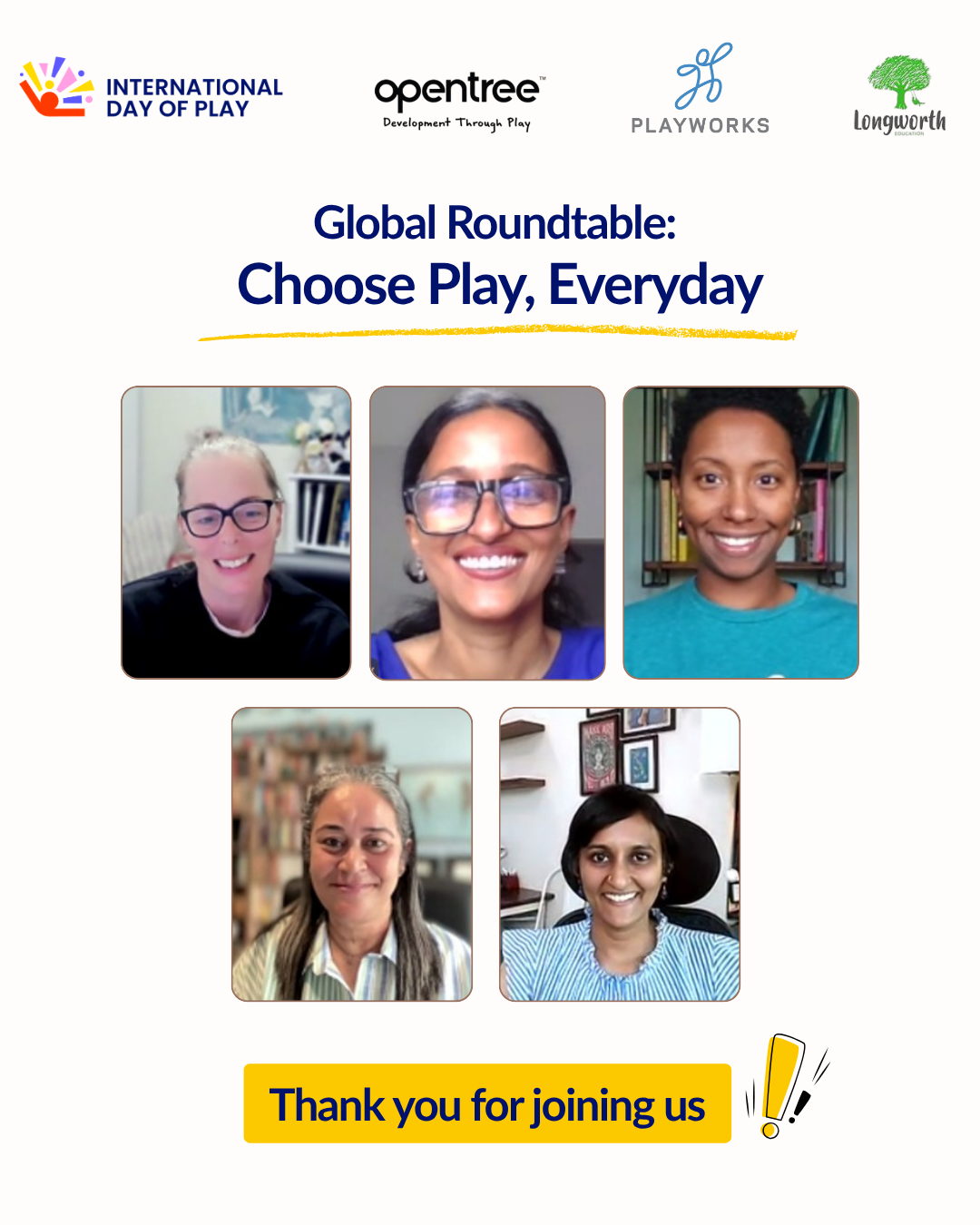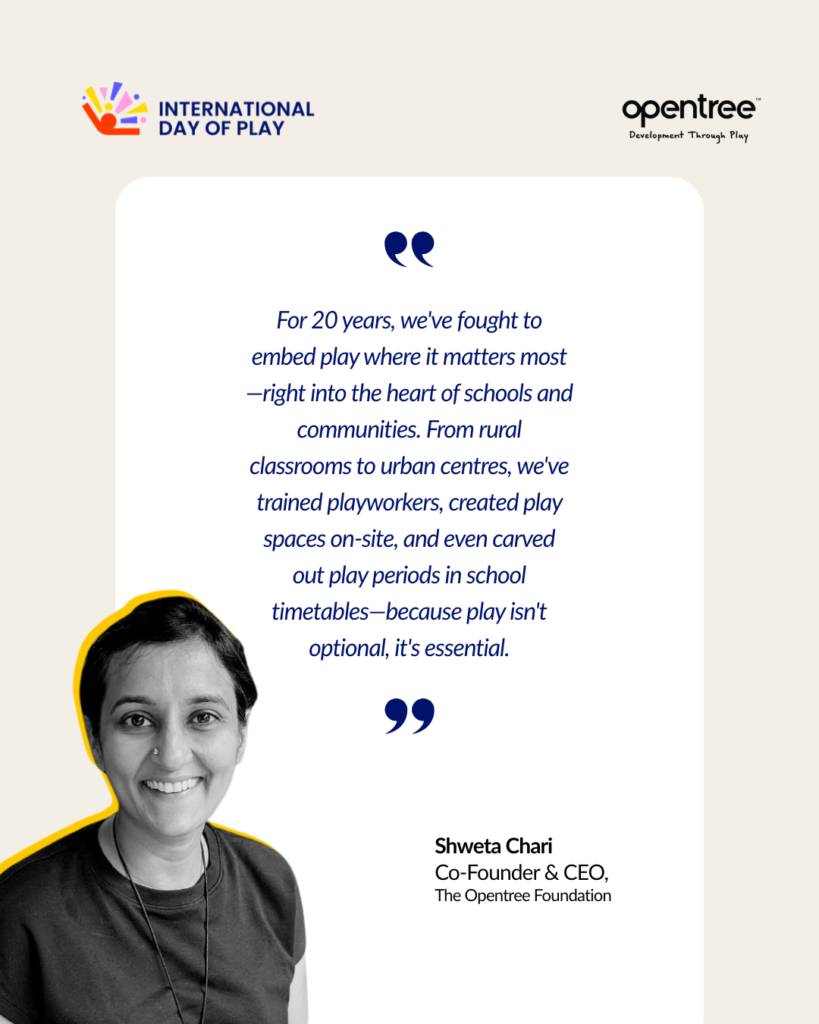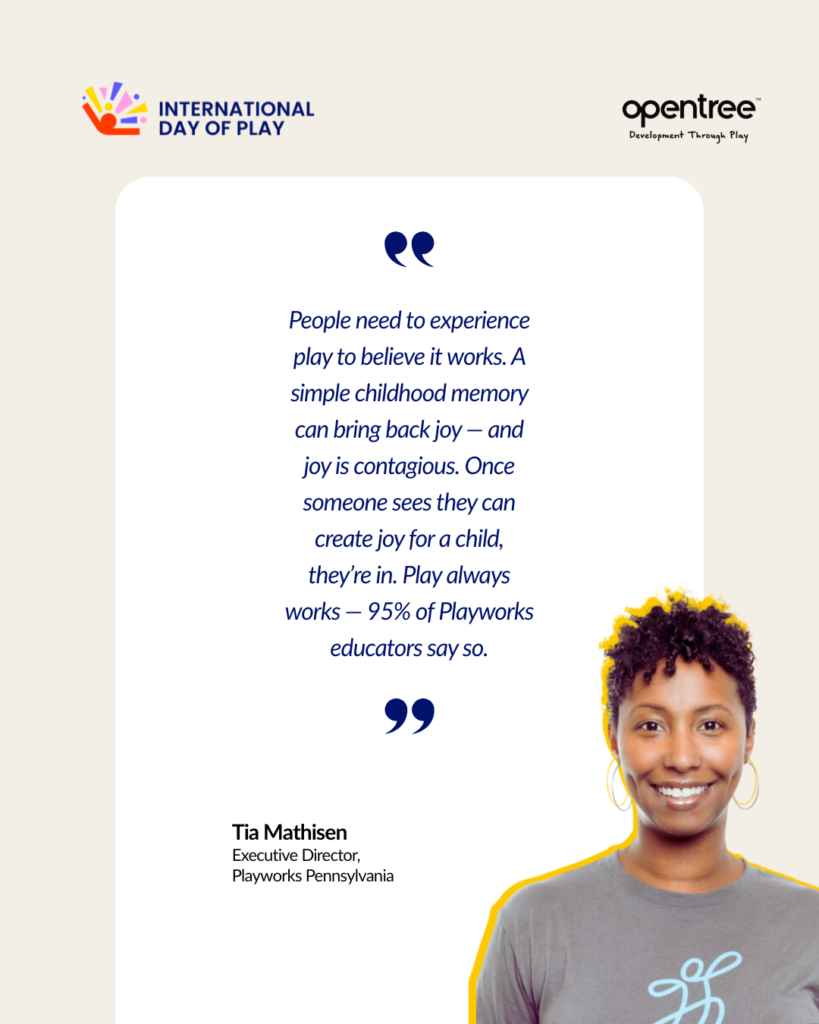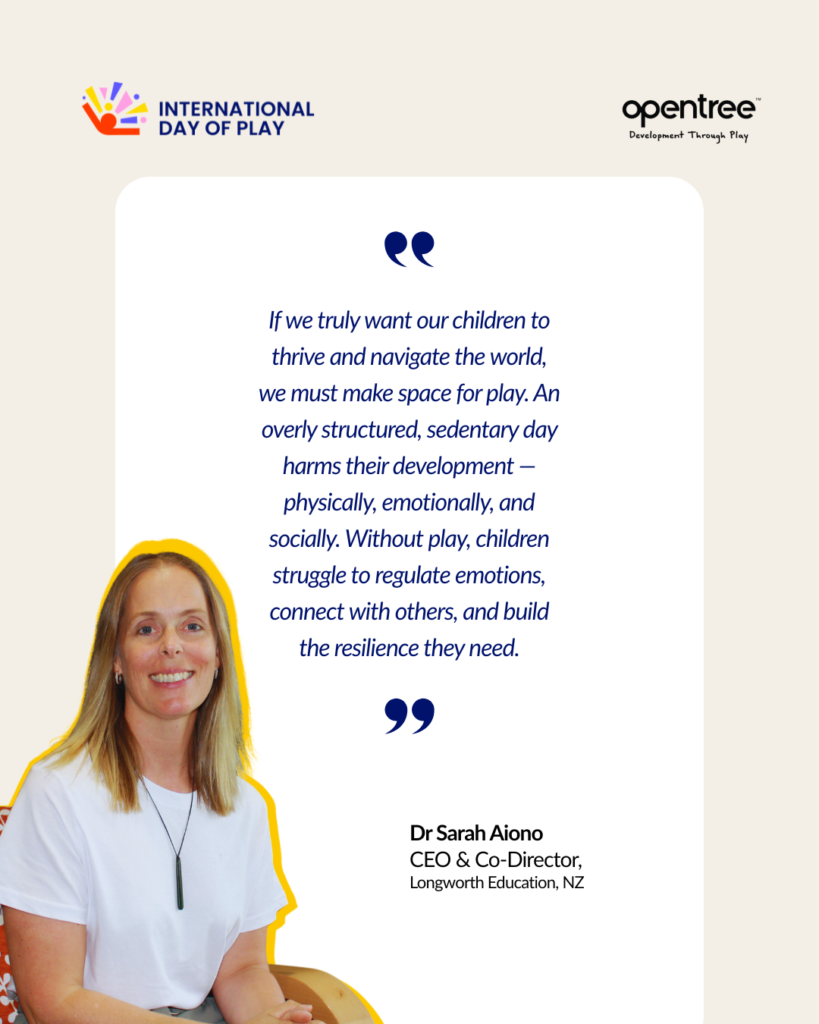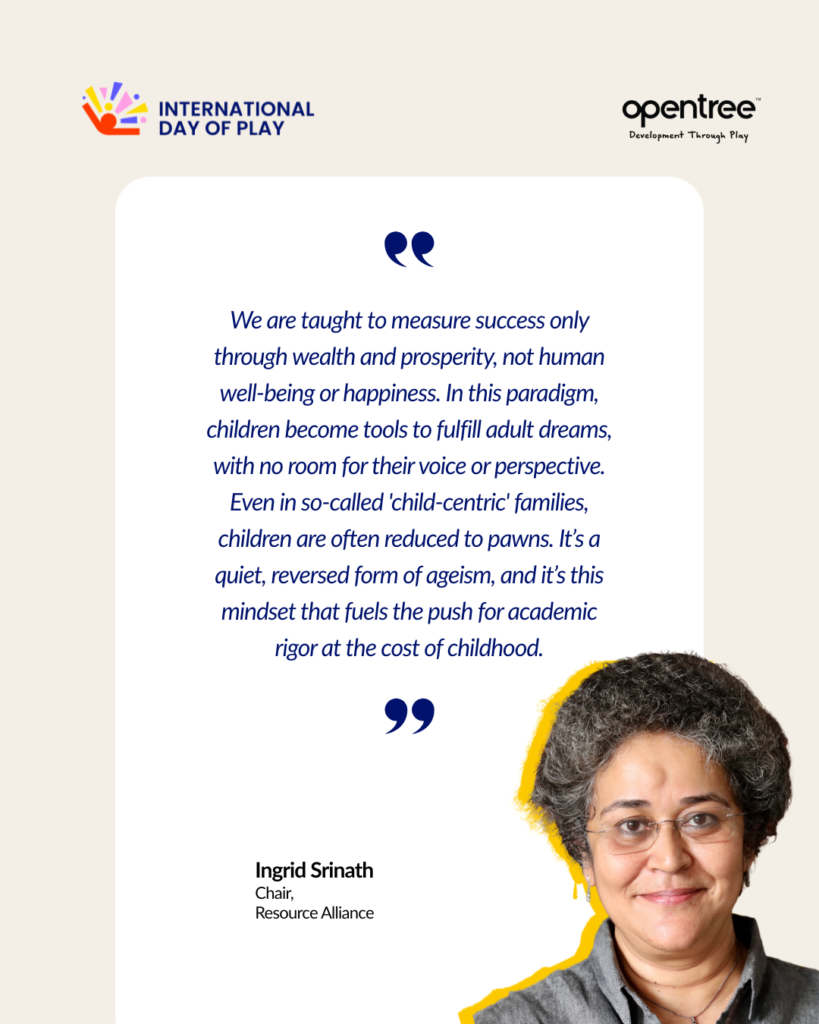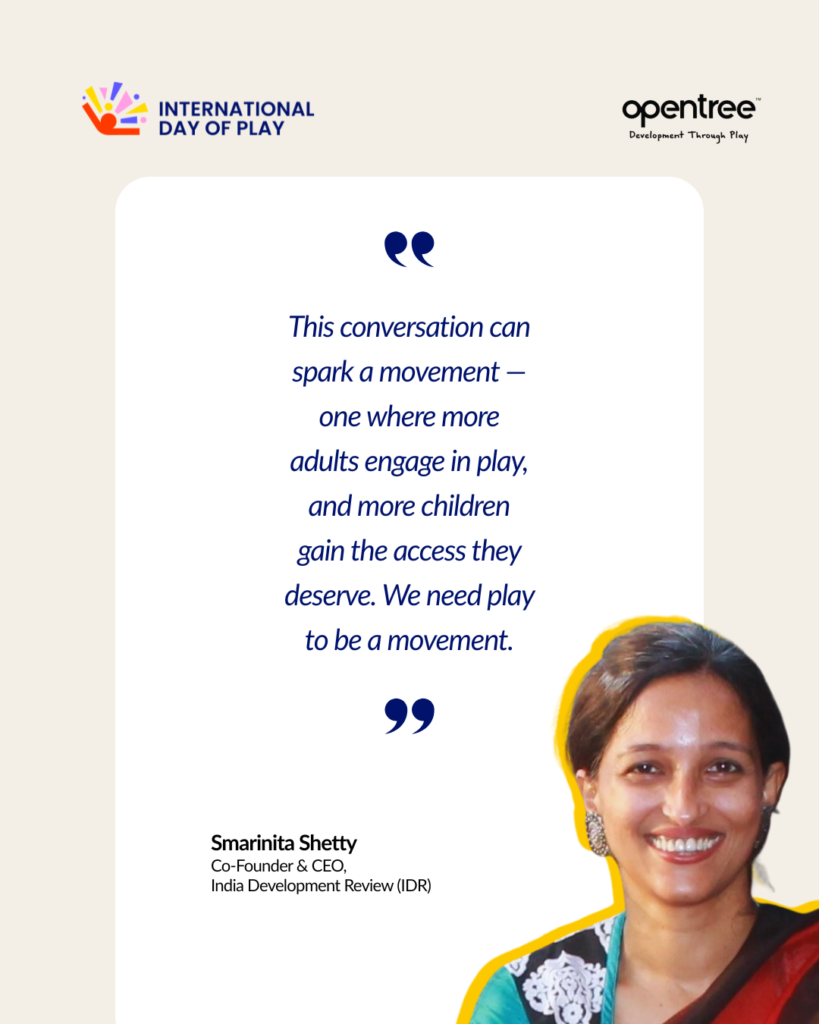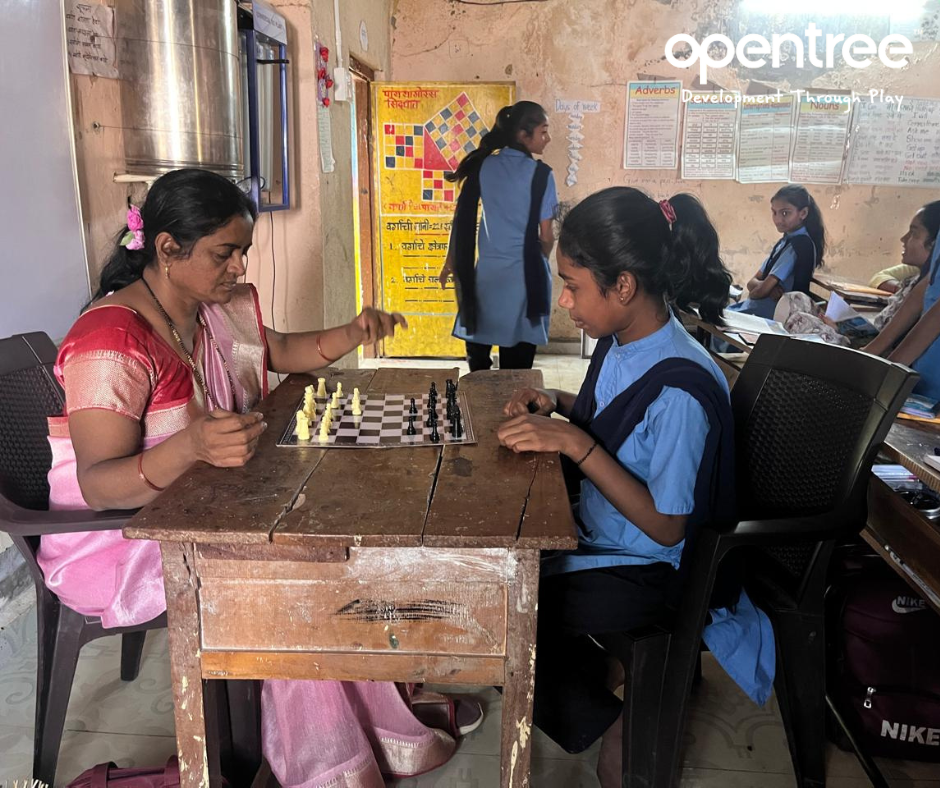Tag: Power of Play
Playful Learning: Class 8 Students Discover Power of Play Through Game Design
Class 8 students of Govind Nagar English School in Malad recently wrapped up their academic year with a playful but powerful experience that demonstrated how deeply play supports learning and skill-building, and what the students had learned through play sessions.
The previous play sessions have exposed them to different kinds of games and got them thinking about the different aspects of problem-solving such as asking questions to find information about a problem, brainstorming solutions for a problem, how do you pick the correct idea and so on.
In this session, we asked students to think about the structure and design of a game. There was a detailed discussion with students about what goes into making the game and how games are designed. Then, there was a conversation about what goes into a game’s mechanics: what are the rules, how does the game progress forward, are there any intentional challenges that are created. For example: in snakes and ladders, you have a snake right before the last block, which makes it difficult for the player to win immediately. We had a conversation with students about how these factors together make a game interesting and then we asked them to develop their own games.
At first, the task felt daunting. A certain group of students were not sure where to begin or how to even structure a game. This is where our Outreach Play Worker (OPW) stepped in and asked them to begin with brainstorming. This encouraged the students to tap into one of the most important skills that play nurtures — creative thinking. As they shared ideas and built on one another’s suggestions, their confidence grew. They decided to design a quiz-based board game with general knowledge as the theme.
The process of creating their own game allowed students to practice collaboration, problem-solving, and communication. They worked together to design a colorful board, draft thoughtful questions, and list down clear rules. Their game was called Mind Masters: General Knowledge.
Following this, the students engaged in feedback, another essential life skill. Members from different groups played their game and provided constructive feedback. The teams analysed it and discussed what could improve, especially in terms of design and rules. They realised their game could be more engaging if they expanded it, so they decided to include questions about different capitals of countries and not just limit it to India, to make the game more challenging.
This iterative process of building, testing, receiving feedback, and refining their ideas helped the students broaden their thinking. They were more open to try something new or adjust their ideas based on group discussions. Each team member brought a unique perspective, and through this collaboration, they strengthened not just their game, but also their interpersonal skills.
Their journey shows that when children are given the space to explore, create, and collaborate through play, they naturally develop critical skills like creativity, adaptability, teamwork, and problem-solving.
This game design activity wasn’t limited to one school. Across Mumbai, students in 12 different schools participated in this creative challenge as part of our play programmes. Each group developed a unique game that reflected their ideas and teamwork. Here’s a glimpse of the games they created:
Match the Card
Grade 6 – MHB Urdu School No. 1
In this memory-based game, players must match pairs of cards. All cards are shuffled and laid face down. Players take turns flipping over two cards at a time. If the cards match, the player keeps the pair and gets another turn. If they don’t match, the cards are turned back over, and the next player takes a turn. The player with the most matched pairs at the end wins.
Shark Attack
Grade 7 – MHB Urdu School No. 1
This exciting elimination game keeps players on their toes. A pile of chits — small slips of paper — is prepared, with most being blank or marked safe, and one featuring a shark. All the chits are tossed into the air or laid out face down. Each player picks one at random. The player who picks the chit with the shark is immediately out of the game. The remaining players repeat the process with the remaining chits, continuing round after round. The game goes on until only one player remains — and that player is crowned the winner. Simple, quick, and full of suspense.
Scale Ludo or Ludo Climb

Grade 8 – Govind Nagar Hindi School
Ludo Climb or Scale Ludo is an exciting twist on the classic Ludo game, designed to test both luck and strategy. Instead of traditional numbered dice, players use a special dice marked with plus and minus signs. The game is played on two vertical scale boards, where players either move up or down based on their dice roll. A plus sign lets the player climb higher, while a minus sign pulls them back down the scale. The challenge is to navigate the ups and downs and be the first to reach the top — known as the “head” — to win the game. With its unpredictable moves and race-to-the-top format, this game adds a new layer of excitement to a familiar favourite.
The Way Home

Grade 8 – Govind Nagar Hindi School
The Way Home is a journey-themed board game where players must travel through exciting checkpoints — a cave and a lake — before reaching the final destination: home. The path is set, and every player must visit all the key locations in the correct order to move forward. Skipping a checkpoint isn’t allowed, adding an extra layer of strategy. The first player to successfully complete the entire route and reach home wins the game.
Oops! Ladder

Grade 6 – MHB Urdu School No. 2
Oops! Ladder is a fun and tricky version of the classic Snakes and Ladders. To start the game, players must roll a 3. If you roll a 4 during the game, you have to move 4 steps backward. The board also has surprise spots — if you land on a number that ends in 0 (like 10, 20, or 30), you go all the way back to the start. Landing on a number that ends in 5 (like 5, 15, or 25) makes you move 10 steps back. The game is full of unexpected twists, making it more exciting and challenging with every move.
Colour Clash
Grade 8 – Malvani Township English School
Colour Clash is a vibrant card game inspired by Point Salad, but with a twist — instead of vegetables, players collect colourful cards. Each card represents a different colour, and players must match them in specific combinations to earn points. The more strategic the match, the higher the score. The game encourages players to recognise patterns and think ahead while making quick decisions. With its bright visuals and simple rules, Colour Clash is a fun way to test memory and strategy.
Countdown Race

Grade 8 – Malvani Township English School
Countdown Race is a thrilling board game where players begin at tile 80 and race their way down to tile 1. Along the way, special coloured tiles give players a boost — orange tiles move you 2 steps forward, pink tiles give you a big jump of 6 steps, and purple tiles add 1 step forward. Players must think carefully about their moves and use the colour boosts wisely to reach tile 1 first and win. It’s a fun mix of luck and strategy, with every move bringing players closer to victory.
Spinning Vegetables

Grade 8A – MPS CBSE Rajawadi School
This is a fast-paced observation game. A spinner indicates a colour, and the player has 15 seconds to find and name three items of that color. Successfully finding all three within the time earns points. The player with the most points at the end wins. The vegetables have been drawn as a guidance so the players get a nudge, incase they cannot think of anything from the respective colours.
Find the Treasure

Grade 8A – MPS ICSE Dadar Wolen School
Find the Treasure is an exciting maze-based game where players embark on a journey to find hidden treasure. Players are given three possible paths to choose from, but beware — choosing the wrong path means you must start over. The challenge is to navigate the maze correctly and be the first to reach the treasure. It’s a game of luck and strategy, where every decision brings you closer to victory.
Fit and Play

Grade 7 – MPS CBSE Tunga Village
Fit & Play is a dynamic and healthy game that combines exercise with fun. Players shuffle blocks on a board filled with different exercise poses. Wherever the block lands, the player must perform the exercise shown on that square. The goal is to stay active and have fun while completing the different exercises.
Do If You Can

Grade 7 – MPS CBSE Mithagar
Do If You Can is an action-packed game where players must complete various challenges to move forward. Using a deck of 31 cards, each labeled with a number, players draw a card and then refer to the challenge board to see what task corresponds to that number. The tasks range from physical activities to mental puzzles. Players must complete the challenge before they can continue in the game. It’s a test of skill, determination, and fun as players race to finish the challenges and become the winner.
These game-design sessions are more than just fun projects. They’re a way for students to explore ideas freely, express their creativity, and develop essential life skills. When children are given time, space, and guidance to create through play, they build a mindset that values exploration, teamwork, and growth.
Cooking Up Skills Through Play With Little Chefs
It all began with a simple craving — a craving for pizza. But this time, it wasn’t just about eating it. It was about making it. Together.
The idea sparked during playtime, as the children chatted about their favourite foods, and just like that, they decided to make their own pizza and the game was on.
What followed was no ordinary kitchen activity — it was an adventure led entirely by the children, powered by imagination, curiosity, and joy. First, they huddled together to list all the ingredients they would need. Tomatoes, cheese, onions, bell peppers… the list grew longer with every excited suggestion.
Then came the expedition. With shopping lists and bags in hand, the little team set off to the vegetable market, the dairy, and even a nearby supermarket. They asked questions, compared prices, bargained shyly, and learned how to choose the freshest produce. The bags were heavy, but not one complaint was heard — because they carried them together.
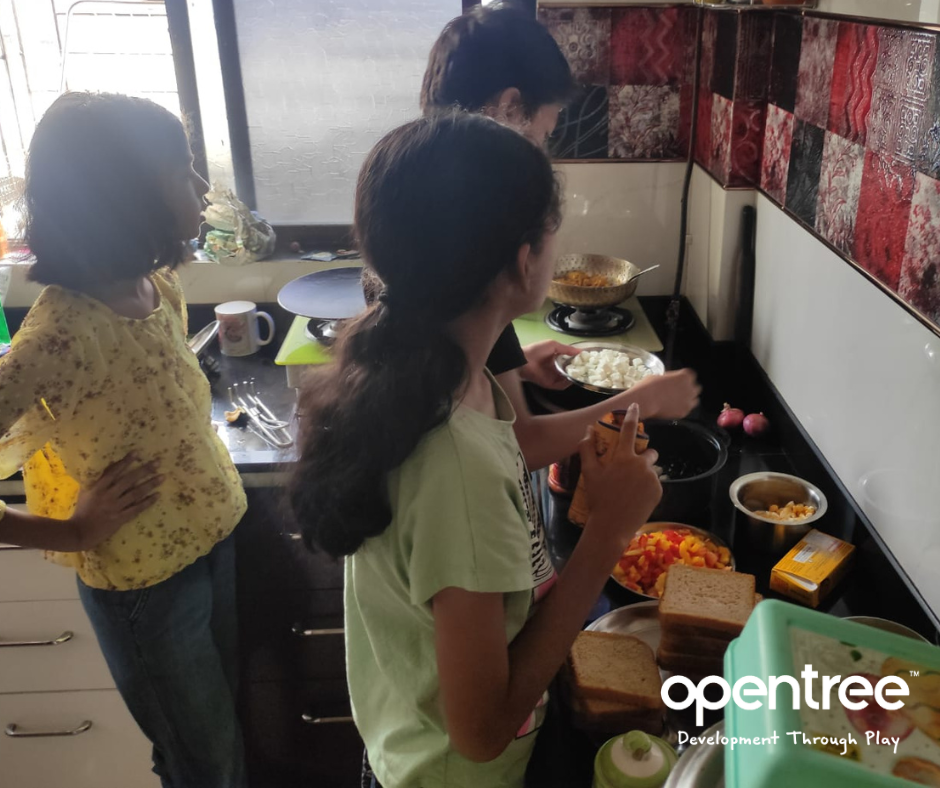
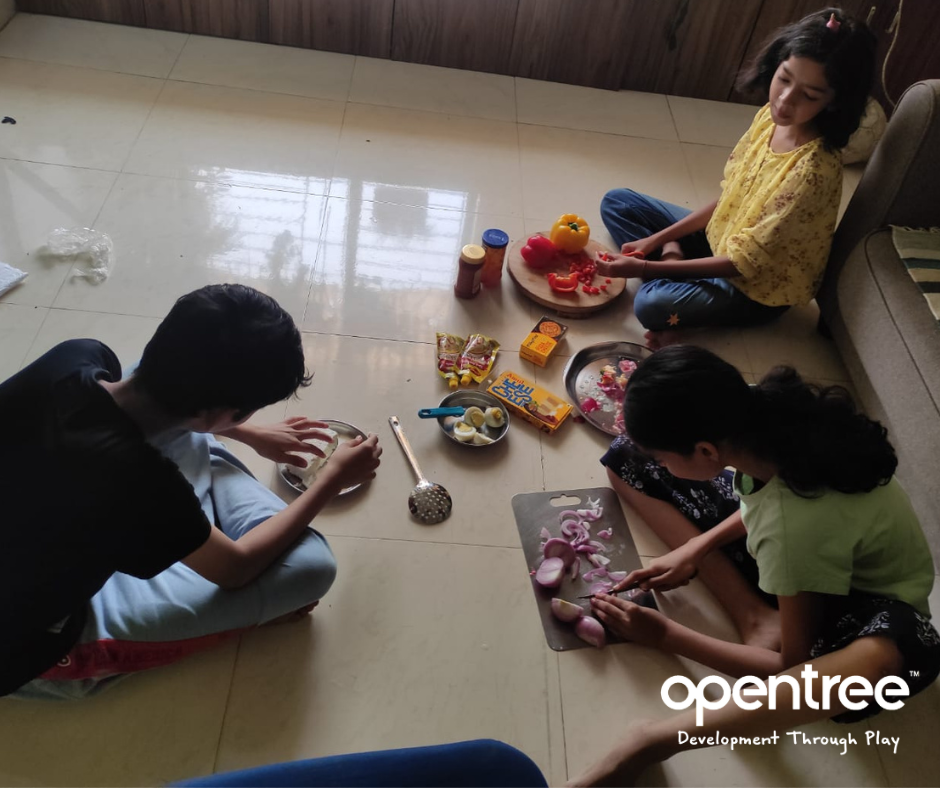
Back home, play turned into purpose. Sleeves rolled up, hands washed, and vegetables rinsed. Some chopped while others debated the best topping combinations. It was messy, noisy, but perfect. Each child had a role, and every task was a tiny triumph — from slicing mushrooms to spreading sauce just right. They took turns, shared tools, and offered encouragement.
When the pizzas were finally ready, they gathered around like proud chefs at a grand feast. It wasn’t just about the taste — it was about the journey. The teamwork, the creativity, the hands-on problem-solving. And the play.
This wasn’t a structured lesson. There were no worksheets, no formal instructions. Yet, in that afternoon of pretend play turned into a real-life project, they learned more than any textbook could offer — how to collaborate, communicate, plan, adapt, and most of all, how to turn ordinary moments into extraordinary memories.
This activity reminded us that play is not separate from learning — it is learning.
Written with inputs from Vijay Suryavanshi, a longtime volunteer at The Opentree Foundation and a supporter of play and play-based learning.
Play, Practice, Checkmate: How Play Sessions Sparked Mansi’s Rise to State-Level Chess
Mansi (name changed) is a Class 7 student at the Zilla Parishad Primary School in Wanwada, Latur. Mansi lives with her siblings, grandparents and parents, who are farmers.
While she is average in academics, she has a keen interest in extracurricular activities. In June 2024, when we introduced play sessions in her school, she was instantly fascinated with the game of chess. She did not know how to play it and had asked other groups in class if she could join them, but they refused, as they all knew the game and had formed their groups. She was still determined to learn it. Though it seemed complex at first, with all its intricate rules and movements, Mansi started observing the other students and tried understanding the game. She learned the basics by merely observing her peers.
One day, Mansi gathered the courage to ask her teacher, Jyoti, if she would play a game of chess with her. Jyoti, who has attended multiple workshops organised by The Opentree Foundation, is a Play Practitioner and often encourages children to play and uses play-based learning in her teaching. When Mansi came with her request, Jyoti readily agreed. During the game, Mansi made several mistakes, but Jyoti remained patient and supportive. Instead of pointing out errors, she took the time to explain what Mansi could do differently, offering advice on strategies and tactics. When her classmates and others overlooked her attempts, it was Jyoti who encouraged Mansi to keep practicing, providing consistent guidance and motivation. Mansi had found a reliable guide who pushed her to persist, experiment, and improve.
Following Jyoti’s guidance, Mansi began playing chess more frequently with her classmates and also her brother at home. What had started as a challenge soon became a passion for her. She began participating in class chess competitions. At first, she lost a few games, but did not let it discourage her. Each defeat taught her something new, and her chess skills and strategies gradually improved. Mansi’s perseverance eventually paid off when she won a chess competition in her class. This achievement motivated her to compete in a school-level chess tournament in February 2025, where she secured the first rank.
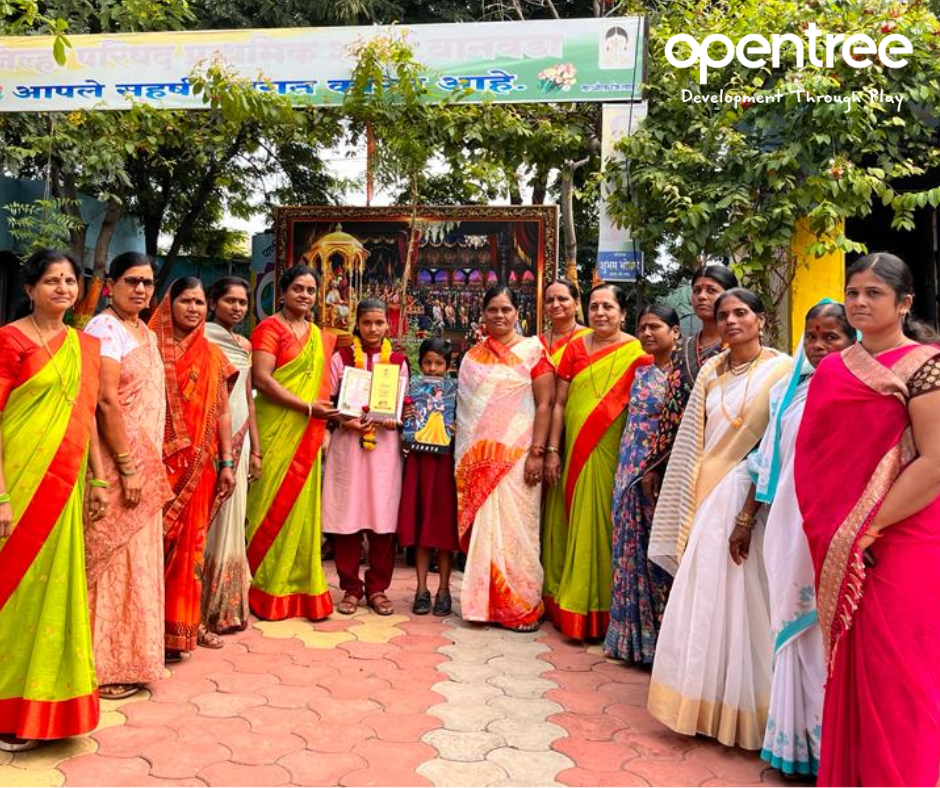
This win marked a turning point for her. As a result of her dedication and practice, she was offered the opportunity to represent her school at the taluka and district levels in the same month. Once again, her hard work led to a first-place finish, which further boosted her self-confidence. Her journey took a significant turn as she went on to represent her school at the state-level. Although she did not win the state competition, she was not discouraged. Instead, she recognised the immense value of the experience and how far she had come, from knowing absolutely nothing about chess to participating in a state-level competition. Her journey is one of determination, growth, and self-discovery.
Mansi’s journey is a powerful reminder of how play can transform a child’s self-image, confidence, and future. Through something as simple yet profound as a game of chess, Mansi discovered her strengths, learned to persevere, and developed a love for learning beyond the classroom. Play not only gave her a voice and a platform but also helped her connect with a supportive adult who believed in her potential. This is exactly the kind of impact The Opentree Foundation strives to create — ensuring that every child has the right, space, and encouragement to play. Through play-based learning and the dedication of Play Practitioners like Jyoti, TOF is helping children unlock their hidden talents, build essential life skills, and thrive in every aspect of their growth.









